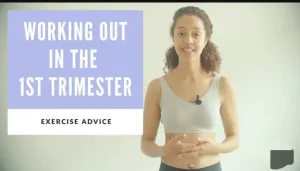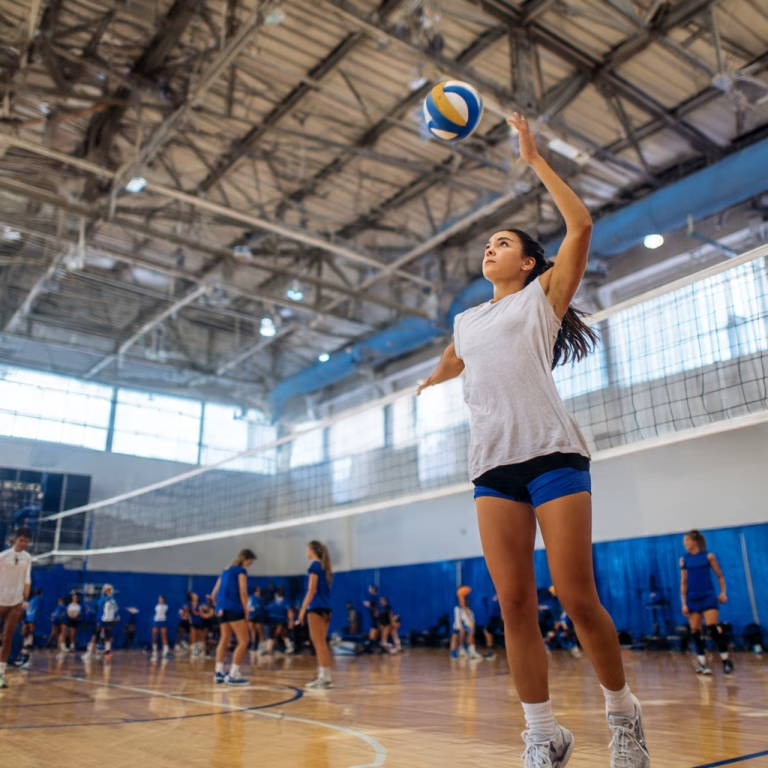Can you play volleyball while pregnant? And When Should I Stop Playing Volleyball While Pregnant? These are frequently asked questions for pregnant women.
Hey there, are you a pregnant mom and also a volleyball player? If you’re wondering when to hang up and take a break from the court while pregnant, you’re in the right place. As a seasoned volleyball blogger and mom myself, I’ve gotten the lowdown on when to stop playing volleyball while pregnant.
Firstly, I want to congratulate you on your pregnancy! This is an exciting time, and it’s amazing that you’re staying active and doing what you love. However, safety always comes first, especially when it comes to your little one.
The safety is where the question of playing volleyball while pregnant comes in. It’s a question that many expectant moms ask, and it’s one that deserves careful consideration.
While volleyball can be a wonderful way to stay active during pregnancy, it’s important to understand the potential risks and benefits and to make informed decisions about when it’s time to put safety first.
In this article, we shall discuss some healthy tips in regards to when you should stop playing volleyball while pregnant and alternative exercises with lower risks to keep yourself healthy during this period.
When Should I Stop Playing Volleyball While Pregnant?

Pregnant Volleyball Player in the First Trimester

The first trimester of pregnancy is a time of rapid change and adjustment for your body. Hormonal shifts can lead to fatigue, nausea, and even mood swings.
While you might be feeling a bit more tired than usual, many women find that they can continue their normal activities, including volleyball, during this time.
At this stage of your pregnancy, the key is to listen to your body and avoid overexertion. If you’re feeling particularly tired or experiencing any discomfort, it’s best to take a break or reduce the intensity of your activities on the volleyball court.
During the first trimester, your body works hard to support the growing baby and adapt to the new hormonal changes, and it’s important to give it the rest it needs.
It’s also a good idea to talk to your doctor about your exercise plans. They can provide personalized advice based on your individual health and pregnancy history.
Pregnant Volleyball Player in the Second Trimester
The second trimester usually brings a surge of energy and a sense of well-being. At this stage, some pregnant female volleyball players can continue to play volleyball with minimal adjustments.
Nevertheless, it’s important to be aware of the changes happening in your body, such as the shifting center of gravity and the growing belly. Below are a few important tips for playing volleyball safely during the second trimester:
- Wear supportive clothing and footwear: a good sports bra and comfortable shoes are essential for providing support and reducing the risk of injury.
- Stay hydrated always: drinking plenty of water is crucial for maintaining your energy levels and preventing dehydration, especially during intense workouts.
- Avoid contact sports: While volleyball is generally considered a low-impact sport, it’s best to avoid any activities that could result in a fall or a direct hit to your abdomen.
- Listen to your body: if you feel any pain or discomfort, stop playing immediately and rest.
Pregnant Volleyball Player in the Third Trimester
The third trimester is a very crucial and delicate time for pregnant women. It is the time for rest and preparation for labor and delivery. At this stage, your body is working hard to support the baby and prepare for birth.
As your belly grows larger, you may find it more difficult to move around and play volleyball, so it is generally recommended to avoid high-impact activities, including volleyball, during the third trimester.
Also, the risk of falling or injuring yourself increases as your balance shifts and your body becomes more sensitive. Instead of playing volleyball, consider alternative forms of exercise, such as:
- Walking
- Swimming
- Yoga
- Prenatal Pilates
See Also: Volleyball Nutrition – Best Foods and Eating Habits for Players
Factors to Consider as Pregnant Volleyball Players
There are several factors that will determine when exactly you should stop playing volleyball as a pregnant woman. Below are some of the most important factors to consider:
1. Your Health and Wellness
If you’re having a healthy pregnancy with no complications, you might be able to continue playing volleyball for a while longer. However, if you have any underlying health conditions or concerns, it’s best to err on the side of caution and stop playing sooner rather than later.
2. Your Stage of Pregnancy
Generally speaking, most obstetricians recommend stopping high-impact activities like volleyball around the 12-14 week mark. This is when your belly starts to grow, and your center of gravity shifts, making it easier to lose balance and risk injury.
3. Your Body’s Language/Signals
Pay attention to your body, Mama! If you’re feeling fatigued, experiencing joint pain, or noticing any unusual symptoms, it’s time to take a break. Your body is telling you something, and it’s essential to listen.
4. Modifying Your Game
If you’re not ready to give up volleyball entirely, consider modifying your game to make it safer for you and your baby. Try switching to recreational games, focusing on technique over competition, or even trying beach volleyball for a softer landing.
5. The American College of Obstetricians and Gynaecologists (ACOG) Guidelines
ACOG recommends avoiding contact sports and high-impact activities during pregnancy. While volleyball isn’t necessarily a contact sport, it does involve quick movements and potential falls.
6. Your Doctor’s Advice
Ultimately, your healthcare provider knows best. Be sure to discuss your volleyball habits with your doctor and follow their guidance. They might have specific recommendations based on your individual pregnancy and health.
See Also: 18 Cute Volleyball Hairstyles for Girls and Men Volleyball Players
When Should You Stop Playing Volleyball While Pregnant?

So, when should you stop playing volleyball while pregnant? The answer varies depending on a few factors, but no matter what trimester you’re in, the most important thing is to listen to your body. If you’re feeling any pain, discomfort, or shortness of breath, stop playing immediately and rest.
Below are some signs that it might be time to stop playing volleyball:
- Increased fatigue: If you’re feeling more tired than usual, it’s a sign that your body needs rest.
- Pain or discomfort: any pain in your abdomen, back, or joints should be taken seriously.
- Shortness of breath: If you’re having trouble catching your breath, it’s a sign that you’re overexerting yourself.
- Dizziness or light-headedness: these symptoms can be a sign of dehydration or low blood sugar.
The Benefits of Staying Active while Pregnant
While it’s important to be cautious during pregnancy, staying active has many benefits for both you and your baby. Regular exercise can help to:
- Improve your cardiovascular health.
- Reduce the risk of gestational diabetes and preeclampsia.
- Boost your mood and energy levels.
- Strengthen your muscles and improve your balance.
- Prepare your body for labor and delivery.
- Promote a healthy weight gain during pregnancy.
How to Make the Right Choices
If you’re unsure about whether or not it’s safe to play volleyball while pregnant, it’s always best to talk to your doctor. They can provide personalized advice based on your individual health and pregnancy history. Below are a few more tips for making safe choices as a pregnant volleyball player:
- Start slowly and gradually increase your activity level.
- Listen to your body and take breaks when you need them.
- Avoid contact sports and high-impact activities.
- Wear supportive clothing and footwear.
- Stay hydrated by drinking plenty of water.
- Talk to your doctor about your exercise plans.
Conclusion
Playing volleyball while pregnant can be a great way to stay active and have fun, but it’s important to be aware of the potential risks and benefits during this period. By listening to your body, making safe choices, and talking to your doctor, you can enjoy the benefits of exercise while keeping yourself and your growing baby healthy and safe.




